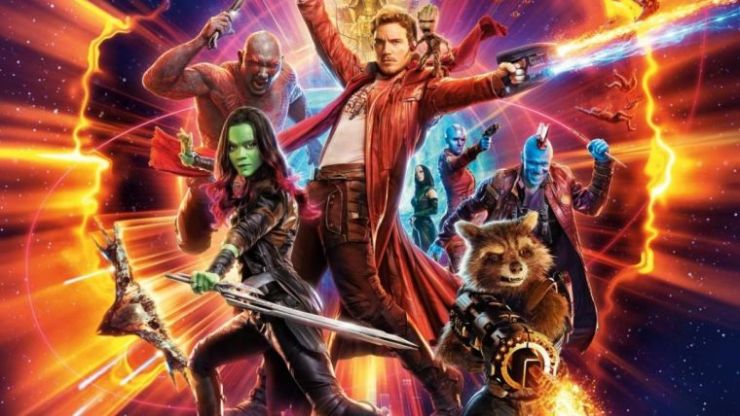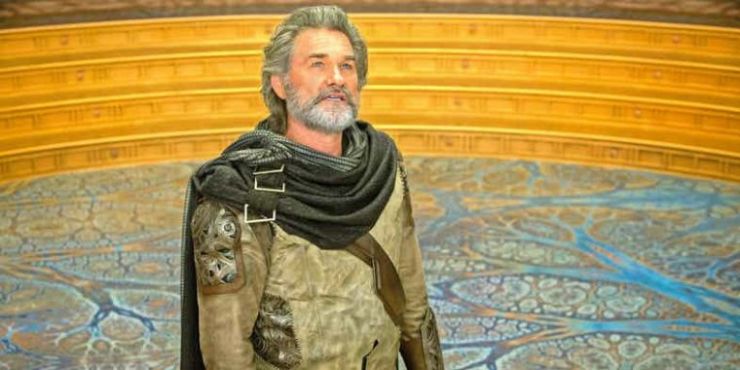The Marvel Cinematic Universe is a bit like capitalism. In order for each film in the increasingly-epic series to really work, the whole thing has to somehow keep growing bigger. Every year brings the addition of new characters, new plot threads, and another extension to the massive canvas on which this box office-busting saga is being played out. It's just like a business that has to keep growing its profits year after year (or rather, it is one).

This sense of continuing escalation is all building to the apparent climax of the MCU – the two 'Avengers' films currently slated for release in 2018 and 2019, starting with Infinity War. With scores of characters and plot threads now in play from the expanding series, it's hard to imagine how directors Anthony and Joe Russo will be able to draw it all together to create a compelling piece of cinema that's more than a two-hour sketch show.
As well as the overall story getting bigger, the content of – and particularly the menace faced in – each individual film now faces a recurring challenge to somehow outdo and go beyond its predecessor. Back in 2008, the first Iron Man film featured a single bad guy who wanted to take over a company, but by the time we got to Avengers Assemble in 2012, our heroes were battling against legions of monsters from another dimension.
Now, some 15 films into the series, the stakes are becoming raised to near-ultimate levels. And so in Guardians of the Galaxy Vol. 2, the latest hotly anticipated superhero epic, the villain is a million-year-old deity who created himself and the world around him.
In fact Kurt Russell's character – Ego – is not only a god, but also importantly a kind of God-the-Father. Yet far from being an all-powerful but ultimately all-good God in the Christian tradition, Ego is more like the nightmarish cartoon that some atheists like to draw of the creator. This God isn't driven by love and a desire to be in community with the things he has created, but by a maniacal desire for universal superiority. He's exactly the kind of judgmental, power-crazed, submission-demanding straw man that the New Atheists have been so keen to propagate in recent years.

It's not just a study in theology, of course. Thematically speaking, Guardians 2 is packed with connections to plenty of the other big questions of life. The space-defending but semi-criminal gang of the title increasingly morphs into a family in this second film – a trajectory already established in its excellent 2014 predecessor. This time the idea is explored more fully: the group are raising a child – the show-stealing Baby Groot, grown from the almost obliterated remains of the first film's tree-like hero – while genetically-engineered racoon-warrior Rocket is struggling to believe that he's truly a part of the family. Most significantly though, the film is about fatherhood, and illustrates two contrasting and surprising images of a father's 'love' for his son. And despite plenty of eye-popping visuals and exciting sequences, it's the relationships between the characters which make the film. We end up really caring about the Guardians and what happens to them – impressive going when one of them is a gun-toting racoon and another a cutesy dancing twig.
At times hysterically funny, the film is carried by strong performances from its ensemble cast, particularly including Zoe Saldana and Karen Gillan (playing out the mother of all sibling rivalries), and the stunningly great Dave Bautista as Drax the Destroyer. Despite being an ex-WWE wrestler playing a character with zero sense of metaphor, Bautista constantly steals the show with his comic timing and strangely-infectious meat-headedness.
It's also a slightly offbeat movie. Strangely paced and a little confusing in places, at times it feels like it's breaking free from traditional cinematic structure in order to indulge its unusual style. The beautifully vibrant colour palette makes it feel incredibly unique, but at times the movie veers into the territory of the strange '70s and '80s sci-fi B-movies from which director James Gunn has surely drawn an influence. Sometimes that works; sometimes the whole thing just feels a bit self-indulgent and weird. It's also important to note that the violent content – while bloodless – is at the stronger end for a film about which many children will undoubtedly be pestering their parents.
It is stunningly imaginative though, and it's quite an achievement that Gunn is still managing to bring new ideas to an increasingly creaking genre. When he succeeds, it's often because of the strangely effective intersection between fantasy and humour (the brilliant opening sequence is perhaps the best example), and overall, that's why Guardians of the Galaxy Vol. 2 will leave the majority of audiences – and especially fans – delighted. Just don't take its view of 'God' too seriously; atheists might want to suggest that God is a monster, but ultimately this film's villain is just another giant for its heroes to conquer. As Star Lord and his friends discover, the light is much more powerful than the darkness, even when it takes a God-like form.
Martin Saunders is a Contributing Editor for Christian Today and the Deputy CEO of Youthscape. Follow him on Twitter @martinsaunders.




